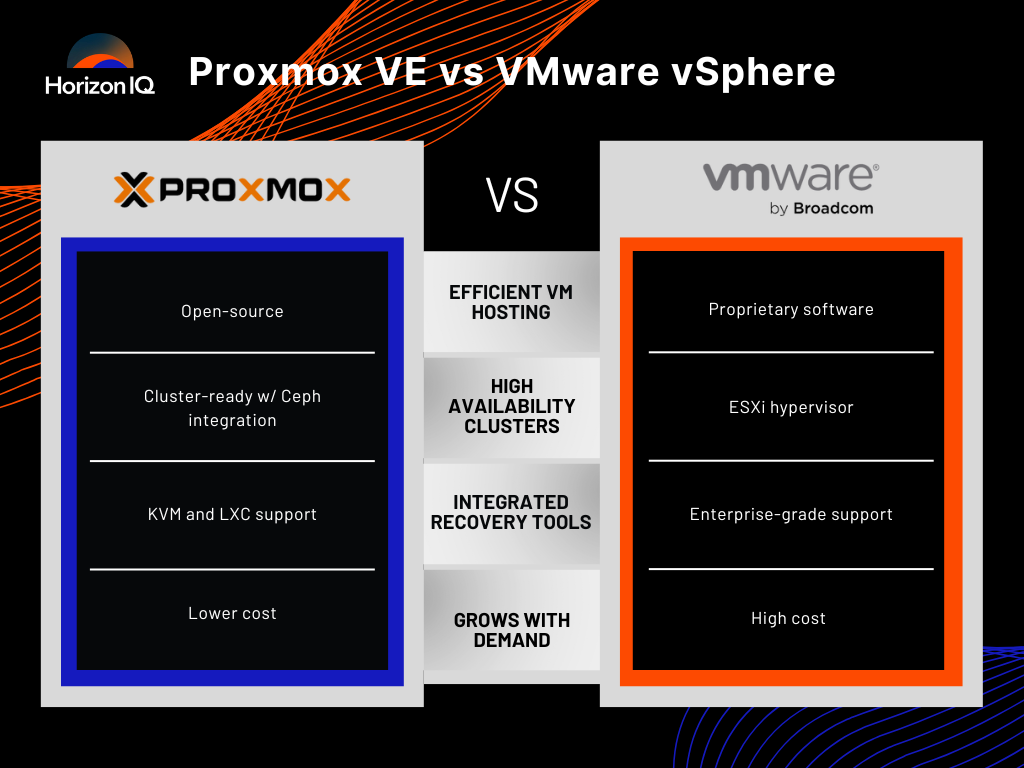
Proxmox vs VMware: Why Proxmox VE is Gaining Traction as an Alternative
If you’re seeing Proxmox vs VMware come up more and more, you’re not alone. Proxmox has a product called Proxmox Virtual Environment (VE), which is an open-source software platform that allows users to manage virtual machines (VMs), containers, and software-defined storage (SDS).
Proxmox VE has been gaining popularity recently, especially following Broadcom’s acquisition of VMware. Broadcom introduced a bevy of changes after the acquisition, which understandably has created anxiety with VMware end users.
In this blog article, we’ll dive into some of the reasons why Proxmox VE is starting to get more attention as an alternative virtual environment management software to VMware.

What is Proxmox VE?
Proxmox VE is an open-source virtualization platform that allows users to create and manage virtual machines and containers.
It combines KVM (Kernel-based Virtual Machine) for full virtualization and LXC (Linux Containers) for lightweight container-based virtualization, all accessible through a simple, web-based interface.
What is VMware?
VMware is a leading provider of enterprise-grade virtualization software, best known for its vSphere suite.
VMware enables businesses to run multiple virtual machines on a single physical server, offering advanced features like centralized management, resource allocation, and automated scaling through tools like vCenter and ESXi.
Proxmox vs VMware Comparison
| Feature | Proxmox VE | VMware vSphere |
| Type | Open-source virtualization platform | Proprietary enterprise virtualization suite |
| Cost | Free (with optional paid support) | License-based, with significant costs for advanced features |
| Primary Use Case | Small to medium-sized deployments, hobbyists | Enterprise-grade virtualization |
| Management Interface | Web-based GUI and command-line tools | vCenter (GUI-based centralized management) |
| Supported Platforms | Linux-based virtual machines and containers | Broad OS support including Windows, Linux, and legacy systems |
| Clustering | Built-in clustering and HA (High Availability) | Advanced clustering, HA, and DRS (Distributed Resource Scheduler) |
| Storage Options | Supports ZFS, LVM, Ceph, and network storage | Advanced storage integration (vSAN, SAN, NAS) |
| Backups | Integrated backup with features like snapshots | Advanced backup tools requiring additional licensing (e.g., Veeam) |
| Ease of Setup | Relatively easy for small setups | More complex but robust for enterprise use |
| Performance | Efficient for lightweight setups and containers | Optimized for large-scale workloads |
| Ecosystem/Integration | Limited third-party integrations | Extensive ecosystem and third-party support |
| Support | Community-driven support; paid support available | Paid support with enterprise SLAs |
| Licensing Model | Open-source GNU AGPL v3 | Commercial proprietary licensing |
| Networking Features | Advanced networking through Open vSwitch, bridges | Enterprise-grade networking with NSX |
| Popularity | Popular among open-source enthusiasts and SMBs | Widely used in enterprise environments |
| Learning Curve | Moderate (simpler for open-source users) | Steeper, with certification options (VCP, VCAP) |
Top 5 Reasons to Consider Proxmox vs VMware
1. Concerns About VMware Under Broadcom
- Increased Costs: The primary change Broadcom implemented after acquiring VMware was to change the license structure and the associated cost. This led to significant increases in cost for VMware end users. As a result, this prompted these VMware end users to explore cost-effective alternatives like Proxmox VE to avoid future pricing issues.
- Support and Service Quality: Broadcom’s focus on high-margin enterprise customers has raised concerns about reduced support for smaller businesses or mid-sized enterprises, leading users to consider open-source and community-driven platforms like Proxmox VE.
2. Proxmox as an Open-Source Alternative
- Cost Efficiency: Proxmox VE is open-source, meaning it is free to use with optional paid support. This appeals to organizations looking to cut costs while maintaining robust virtualization capabilities.
- Community-Driven Development: Proxmox benefits from an active open-source community, providing continuous development and innovation without reliance on a corporate owner.
- Transparency: As open-source software, Proxmox allows organizations to audit, modify, and tailor the platform to their needs, offering greater control over their infrastructure compared to proprietary solutions.
3. Feature-Rich and Easy-to-Use
- Integrated Features: Proxmox VE combines virtualization (KVM-based), containers (LXC), and storage management (ZFS) in one platform, which is appealing for organizations seeking simplicity without sacrificing functionality.
- Ease of Use: The web-based interface and well-documented API make Proxmox VE accessible for IT teams without specialized training.
- High Performance and Flexibility: Proxmox VE supports advanced clustering, backups, and high availability at a fraction of VMware’s cost.
4. Focus on Data Sovereignty and Control
- Companies concerned about lock-in or data sovereignty prefer Proxmox for its independence from a large corporate ecosystem. Proxmox users can host their infrastructure entirely on-premises or with preferred service providers, avoiding cloud dependency.
5. Support for Hybrid and Edge Deployments
- Proxmox is lightweight and can efficiently support hybrid and edge computing deployments, which is particularly valuable for small to medium-sized businesses.
Proxmox VE on HorizonIQ Bare Metal
Unlike other infrastructure as a service providers, HorizonIQ allows customers to run Proxmox VE on our bare metal fleet in order to create a private cloud.
In this model, HorizonIQ would manage the underlying server infrastructure while the customer would be responsible for installing and managing their virtual environment using Proxmox VE.
Proxmox vs VMware Summary
The uncertainty introduced by Broadcom’s acquisition of VMware, combined with Proxmox VE’s cost-effectiveness, open-source model, and robust features, makes it a compelling alternative.
Organizations seeking to ensure control, predictability, and flexibility in their IT infrastructure are driving the rising adoption of Proxmox VE. HorizonIQ provides the best foundation to deploy your Proxmox VE-based virtualized environment. Contact us today to learn more.



